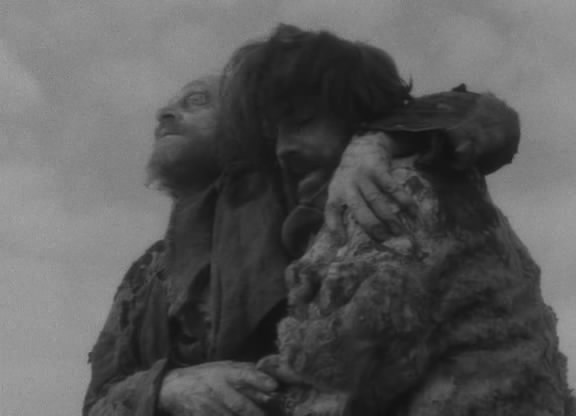I suppose talking about Shakespeare and about King Lear in particular is like talking about the Bible, as far as the conclusiveness of any interpretation goes. But these were a few thoughts I spun out off the cuff, which is probably an easier way to approach criticism of cultural icons than engaged, direct thought, the associations long having permeated collective consciousness in ways that would take a lifetime just to quantify.

Gloucester and Edgar at Dover Cliff
I’m responding to this passage at Big Thought, Only a Monster Never Gives Up Hope:
Among the appalling sights Primo Levi witnessed at Auschwitz was the fervent prayer of a prisoner grateful to be spared the ovens. “I see and hear old Kuhn praying aloud,” Levi wrote, “with his beret on his head, swaying backwards and forwards violently. Kuhn is thanking God because he has not been chosen.” Levi was as baffled as he was angry: “Does Kuhn not understand that what has happened today is an abomination, which no propitiatory prayer, no pardon, no expiation by the guilty, which nothing at all in the power of man can ever clean again? If I was God, I would spit at Kuhn’s prayer.”
It’s Edgar who believes always that “the gods are just,” and Edgar who says the famous lines “Men must endure/Their going hence, even as their coming hither./ Ripeness is all.” We must, he says, have faith, and trust in good. He never seems to grasp that some abominations shouldn’t be endured—that there is a point where respect for the gods becomes contempt for people. Such true believers may be necessary to see communities through the worst times. But they are, in their indifference to suffering, monsters.
Edgar is problematic in so many ways that this criticism can be easily derailed, but it’s also something to be taken seriously.
The original post cites A.D. Nuttall, who said that Stephen Medcalf convinced him that the play was indeed Christian and non-nihilistic, if not exactly a tale of salvation. Nuttall writes, “An ethically nihilist play would leave one thinking that good and evil have no meaning. King Lear lives us with a sharpened sense of the difference between good and evil, and, lying behind that, of the difference between goodness and nothingness.”
The original post overlooks a more problematic act by Edgar, worse than “Look up!”, which is his trick with Gloucester on Dover Cliff to make Gloucester think he’s been saved by God. The trick works, and Gloucester is “redeemed”–he wins new resolve. And he never finds out about the trick and dies at least partly happy in that ignorance.
But neither Edgar’s hope nor Gloucester’s hope are the hope of the play.
Now, things are very ambiguous here, but I’ll go on what I take to be general audience reaction to the play. Hope remains as an integral part of Lear, not through Edgar. Quite the opposite, since Edgar prescribes anything but hope. Hope is in most everyone in the audience who cannot bring themselves to stop giving a damn about this world. Under this view, the death of Cordelia serves as a test, because if the world truly is Nothing Nothing Nothing and we are all Saved in the next world (or even if we’re not), her death should be of no consequence. But it’s of great consequence to most anyone who watches the play, particularly if there is a sense of outrage over the pointlessness and gratuitousness of it. And that inability to maintain apathy is inextinguishable hope, through attunement to suffering.
I’m thinking here of something Stephen Booth said about Cordelia’s death being significant precisely because of its unexpected placement in the denouement: “Shakespeare presents the culminating events of his story after his play is over.”
This interpretation emphasizes the bleeding of the tragedy out of the realm of the theatrical and into a spectator’s very corrupted sense of narrative, having been given a story that’s in excess of the narrative structure of the play, and very depressingly so. King Lear would be an encouragement not to give up on this world, not to succumb to Gnostic temptation and its peculiar theodicy that would have us give up on this world as hopelessly evil and seek salvation in some unearthly realm of God.
Now, the Church most certainly did not want people to give up on this world, hence their need to squash Gnostics as heretics. In this sense Lear can be seen as not only Christian, but even rather Catholic. But I take no position on this issue.
But to return to the original point: I say “most everyone” can’t stop giving a damn about Cordelia. The issue for someone like Jean Amery, when he talks about his experiences in Auschwitz in World War II, is whether someone in Auschwitz can still be moved by Cordelia’s death in the absence of some theodicy, Gnostic or not. Amery, thinking along the lines of Primo Levi but even more darkly, says no. He cites Christianity, Orthodox Judaism, and Marxism as some of the telelogical theodicies that kept their believers hopeful in the camps, kept them believing in the possibility or even the inevitability of meaning. The secularists, intellectuals, poets, and sensitive cultured types, however, were not able to sustain themselves.
